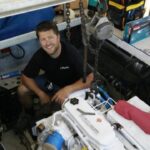Cummins Marine Diesel Repower Specialists › Forums › General Discussion › How Do Diesel ECM's Typically Calculate Fuel Burn and Engine Load
- This topic has 9 replies, 6 voices, and was last updated 3 years ago by
Eric Emme.
-
CreatorTopic
-
October 16, 2018 at 9:52 am #38526
Wondering if anyone knows, for marine diesel engines with ECMs, what the typical approach is for calculating fuel burn and engine load as reported by the ECM? I had assumed the fuel flow was monitored directly and that was reported by the ECM, and compared to the RPM and perhaps other factors to calculate engine load.
Over the weekend, a cummins tech told me that typical “recreational” class marine diesels do NOT measure fuel consumption directly – the ECMs “estimate” it as a function of throttle position and perhaps some other direct measurements to generate an estimate based on calibrations from factory dyno testing among other things.
-
CreatorTopic
-
AuthorReplies
-
July 21, 2020 at 3:41 pm #101172
Eric EmmeParticipantVessel Name: King's Legend
Engines: Cummins QSC 8.3
Location: Seattle
Country: USA
Thanks. Your statement about accuracy gets to the crux of my issue – which is the ongoing mystery i’ve been trying to figure out as to why one of my motors appears to be burning ~15% more fuel (with correspondingly higher engine loading) than the other. I’ve gone through everything I can possibly think of – ruling out props, running gear, intake leak/inadequate boost, EGT differences, etc..
Nicholas – I am curious as to whether you ever resolved this issue? I am having a similar issue on my Cummins QSC 8.3.
Last week I had the prop’s repitched. Before the work, fuel consumption (via the mercury smart craft gauges) was within 1/10 GPH at all rpms. After the repitch the port side now claims 10% more fuel consumption. Weird.
I had a cummins tech on board today, and they hooked up a computer, and ran a cut out test, and cylinder test – they can’t find anything ‘wrong’. The idea of fuel restriction (in my case I want to point a finger at poorly performing injectors) makes sense, but no error codes point to a smoking gun.
But even their computer claimed different fuel consumption than the smartcraft gauges. Their computer claimed 5.2 gph at 2200 rpm\no load. Smartcraft claimed 3.0 gph.
Thanks in advance
October 19, 2018 at 6:15 pm #38703
Fireisland1ParticipantVessel Name: Riverwind
Engines: cummins QSB 380
Location: long island n.y.
Country: usa
I just did a rate test on my QSB 380. Smart Craft said 40 Gal. Actual consumption was 39.5. Not bad
October 16, 2018 at 3:04 pm #38549
Rob SchepisForum ModeratorVessel Name: Tenacious
Engines: 6BTA 5.9 330's - "Seaboard Style"
Location: Long Island, NY
Country: USA
Yes that does make sense. Are there any common culprits to cause a fuel restriction besides just needing to change filters?
Here’s an article on restrictions.
https://www.sbmar.com/articles/understanding-fuel-line-sizes-vs-fuel-supply-restriction/
October 16, 2018 at 2:18 pm #38545Yes that does make sense. Are there any common culprits to cause a fuel restriction besides just needing to change filters?
October 16, 2018 at 2:03 pm #38544
Corey SchmidtForum ModeratorVessel Name: Rebel Belle
Engines: Cummins
Location: Oxnard, CA
Country: USA
Thanks. Your statement about accuracy gets to the crux of my issue – which is the ongoing mystery i’ve been trying to figure out as to why one of my motors appears to be burning ~15% more fuel (with correspondingly higher engine loading) than the other. I’ve gone through everything I can possibly think of – ruling out props, running gear, intake leak/inadequate boost, EGT differences, etc.
In certain circumstances, the algorithm can become skewed when elements such as fuel restriction enter into the equation. When fuel restriction is present (and not accounted for via the ECM), the engine computer will automatically increase throttle to compensate, thus skewing the algorithm results for fuel consumption and % load… make sense?
October 16, 2018 at 12:51 pm #38536I am going off the ECM reported fuel burn but I have tried to “sanity check” it based off the “fill, run, and refill” approach. The problem is that a single 400 gallon tank feeds both engines, so for something like this it only provides a rough confirmation that the time averaged fuel burn across both engines is “about right.”
October 16, 2018 at 11:34 am #38533
johnParticipantAre you going of just the computer for fuel burn? Have you tried the old fashion way of filling the tanks and then refilling to see fuel burn. Not to say the computer is wrong but this will verify the numbers. To me if your burning 15 percent more fuel you should see that in egt.
October 16, 2018 at 10:30 am #38531Thanks. Your statement about accuracy gets to the crux of my issue – which is the ongoing mystery i’ve been trying to figure out as to why one of my motors appears to be burning ~15% more fuel (with correspondingly higher engine loading) than the other. I’ve gone through everything I can possibly think of – ruling out props, running gear, intake leak/inadequate boost, EGT differences, etc..
The way the topic came up was I relating my situation to a cummins tech at a boat show, wondering if my next step should be to pull the head and have a look inside. He told me since the EGTs matched, i’d ruled out props and/or misalignment, not getting much if any smoke except at startup and initial throttle up, etc., he thought the most likely explanation was that for ~15 year old engines it’s just not calculating the fuel burn very accurately. He told me about how it was calculated, not measured, which I wanted to check up on.
But it sounds like your experience is the fuel burn, despite not being measured directly, is pretty accurate.
October 16, 2018 at 10:07 am #38528
Corey SchmidtForum ModeratorVessel Name: Rebel Belle
Engines: Cummins
Location: Oxnard, CA
Country: USA
That statement is essentially true, from what I know and understand about engine ECM’s… the fuel consumption and a few other parameters are “algorithms” that are calculated by measuring hard input parameters such as direct throttle position, RPM, pressures, etc. to calculate the amount of fuel actually consumed instantaneously and load factor. And although those numbers are calculated, the information is reliable and pretty darn accurate.
1 user thanked author for this post.
-
AuthorReplies
You must be logged in to reply to this topic.
